Roberson

-
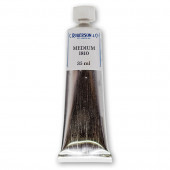
Roberson 1810 Medium
Starting at: £34.20
This is a traditional, high-oil "fat" painting medium, made using the highest quality materials. It will retain colour strength, is resistant to bleeding, has good flow release, is ideal for blending, and can be mixed with oil colours in any ratio. When dry, it creates an enamel-like surface.
Contains: Stand oil, Cold-pressed Linseed oil, Canada Balsam, Rectified Spirit of Turpentine, Beeswax, Driers.
Clean tools in white spirit. Do not use as a varnish, always mix with oil colour.
Learn More -
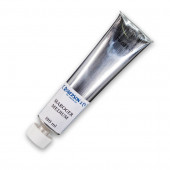
Roberson Maroger Medium
Starting at: £18.60
Roberson Maroger Medium can be mixed in equal parts with oil colours to give a lasting brilliance and workable consistency to paints. It prevents sinking when using a wet-in-wet techniques.
Contains: Damar Resin, Gum Arabic, Linseed Oil
Learn More -
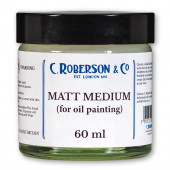
Roberson Matt Medium
Starting at: £13.50
Roberson's Matt Medium creates a dead-flat finish when mixed with oil colour. It aids the flow and increases the artist's control of oil paint, allowing for smooth application flat brush marks with low edges. It can be mixed with oil paint in any ratio. Learn More -
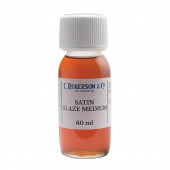
Roberson Satin Glaze Medium
Starting at: £9.80
Mix with tube oil colours or pigment to improve flow and translucency. For thin glazes, fine details and smooth brushwork. Learn More -
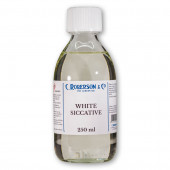
Roberson White Siccative
Starting at: £8.40
A strontium-based siccative, milder than cobalt driers. Add sparingly to oil colours to accelerate drying, particularly recommended for pale colours. Learn More -
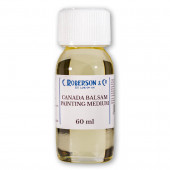
Roberson Canada Balsam Medium
Starting at: £39.10
A high quality painting medium which will produce a deep glow, made from Canada Balsam and Turpentine. Especially effective with transparent oil colours, it is recommended as the medium of choice in the final stages of an oil painting. Learn More -
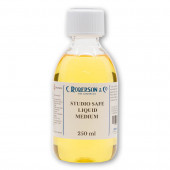
Studio Safe Liquid Medium
Starting at: £17.10
Studio Safe Liquid Medium is a mix of Studio Safe Solvent and natural artists' oils. It is used to thin paint and increase gloss. This product is non-aromatic, non-flammable and has an orange scent. Learn More -
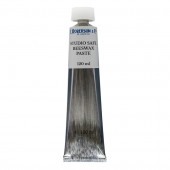
Roberson Studio Safe Beeswax Medium
Starting at: £18.60
A safe wax medium for impasto effects. This medium retains palette knife marks and brush strokes, remains thick and doubles paint easily, drying to a matt finish.
Studio Safe products are non-aromatic, non-flammable, and have a pleasant orange smell.
Learn More -
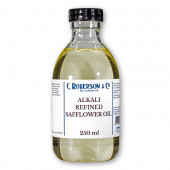
Roberson Safflower Oil
Starting at: £7.70
Safflower Oil is light-coloured, making it suitable for grinding pale pigments. It is still sometimes used as a binder for commercially available paints, although due to its very slow drying time it is best reserved for the final layers of a painting. Compared to Linseed oil, Safflower Oil will give a matte finish.
Learn More -
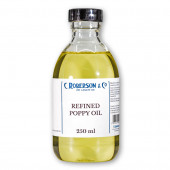
Roberson Poppy Oil
Starting at: £10.20
Poppy Oil is a slightly later addition to the artist's cabinet than Linseed Oil and Walnut Oil. It is generally used as a binder for pale colours, where the warmth of Linseed Oil is not desired. It provides a matte finish and dries very slowly, so we would not advise using it in conjunction with slow-drying pigments or in underpaintings. A paint film produced by Poppy Oil is weaker and softer than that created by Linseed Oil. This is because it contains a smaller percentage of linolenic acid than Linseed Oil; this substance imparts both strength and yellowness to an oil.
Although some of these properties can be perceived as drawbacks, paints made with Poppy Oil generally obtain a "short" or buttery texture without the addition of waxes or other additives, which can be an advantage for certain colours that produce poor consistencies in Linseed oil alone. Sometimes, the addition of a small quantity of Poppy Oil when grinding a tricky or "stringy" pigment in Cold Pressed Linseed Oil can introduce some of benefits of Poppy Oil, without transmitting its negative characteristics.
Paints made with Poppy Oil are particularly suited to "alla prima" working methods, where paint is applied spontaneously. When working in successive layers, Poppy Oil would only be appropriate for the final stages of a painting.
Learn More -
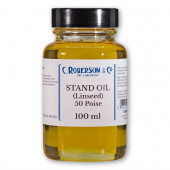
Roberson Linseed Stand Oil
Starting at: £10.50
Linseed Oil is derived from flax seeds, and appears on our shelves in many guises: Cold Pressed, Refined, Stand Oil, and as a key ingredient in many mediums. It has been appreciated for its drying properties since the Medieval period, and has become the most popular oil used in painting today due to the strong, flexible and glossy film that it creates.
Stand Oil is paler and more viscous than other Linseed Oils, having been heated and kept at temperature to provoke a molecular change. It is not suitable for grinding colours, but it is a very versatile ingredient that can be thinned with turpentine to create a glazing medium or be included in a varnish. Stand Oil is notable for its ability to smooth out brush strokes to create an enamel-like surface.
Learn More -
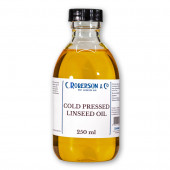
Roberson Cold Pressed Linseed Oil
Starting at: £7.50
Linseed Oil is derived from flax seeds, and appears on our shelves in many guises: Cold Pressed, Refined, Stand Oil, and as a key ingredient in many mediums. It has been appreciated for its drying properties since the Medieval period, and has become the most popular oil used in painting today due to the strong, flexible and glossy film that it creates. Cold Pressed Linseed Oil is ideal for the grinding of pigment to make oil paints. The process of producing Cold Pressed Linseed Oil results in a lower yield, but the resultant oil is of a superior quality to oil that has been extracted by other methods, creating a paint film that is more resistant to embrittlement on aging. Its yellow colour is caused by the high concentration of linolenic acid, the presence of which provides durability to the paint film. The amount of oil that each pigment requires can vary enormously. Alizarin Crimson, for example, requires a high percentage of oil compared to most other colours. We would always recommend mulling the pigment and oil together thoroughly to create a "short" or buttery paste, with evenly dispersed, well-coated pigment particles. This process contributes to the strength and flexibility of the paint film, and prevents the inclusion of excess oil. Origin: USA Learn More -
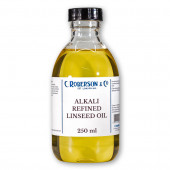
Roberson Refined Linseed Oil
Starting at: £13.30
Call to Order
Linseed Oil is derived from flax seeds, and appears on our shelves in many guises: Cold Pressed, Refined, Stand Oil, and as a key ingredient in many mediums. It has been appreciated for its drying properties since the Medieval period, and has become the most popular oil used in painting today due to the strong, flexible and glossy film that it creates.
Alkali Refined Linseed Oil has been treated to reduce its acidity, and is a useful ingredient in mediums and varnishes.
Learn More -
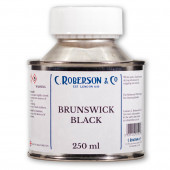
Roberson Brunswick Black
Starting at: £14.10
White spirit-based slower drying alternative to SOV. Learn More -
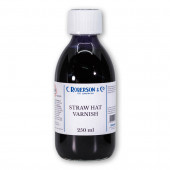
Roberson Straw Hat Varnish
Starting at: £37.50
Varnish (Black Dark) Meths based quick drying stopping out varnish, two coats may be needed for a good acid resist. Learn More -
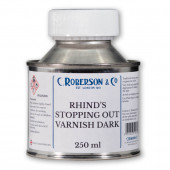
Roberson Rhinds Stopping Out Varnish
Starting at: £8.60
Traditional strongly resistant SOV. Very dark and opaque finish. Appropriate for backing the plate as well as stopping out areas. Learn More -
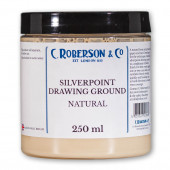
Roberson Silverpoint Drawing Ground
Starting at: £13.50
A natural bone ash primer for paper and card for silverpoint drawing, tinted to a traditional off white or sanguine finish. Learn More -
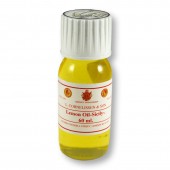
Cornelissen Lemon Oil
Starting at: £12.30
Lemon oil is an essential oil, primarily used for its scent. Learn More -
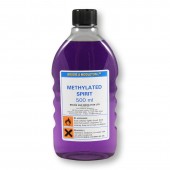
-
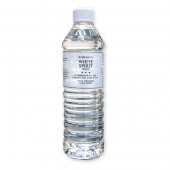
Roberson White Spirit
Starting at: £7.50
Plastic container. Solvent distilled from crude petroleum oils. Used to thin colour and to clean brushes. Slower drying time than turpentine. Learn More -
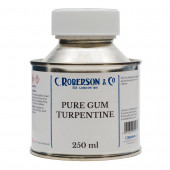
Roberson Pure Gum Turpentine
Starting at: £14.00
Slightly less refined than rectified spirit of turpentine. Often preferred as constituent of painting mediums. Learn More -
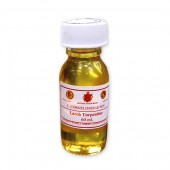
Cornelissen Larch Venice Turpentine
Starting at: £28.80
Venice Trupentine is a thick, resinous liquid extracted from the Larix decidua, a larch tree native to Austria. It can impart luminosity, brilliance and gloss when used in mediums and varnishes, and as such it was highly valued during the Golden Age of painting in Venice. It is a slow-drying balsam, which can be diluted with turpentine or placed in a bath of warm water to aid flow.
Learn More -
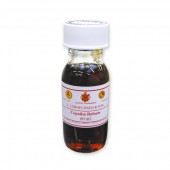
Cornelissen Copaiba Balsam
Starting at: £20.80
Copaiba Balsam comes from the South American tree Copaifera landsdorfii. Its primary function is to improve the appearance of paint layers that may have become dull, brittle or sunken upon drying. It is a viscous liquid that may be diluted with turpentine, but which should not be used in painting mediums.
Learn More -
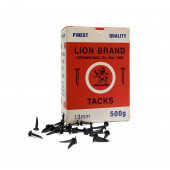
-
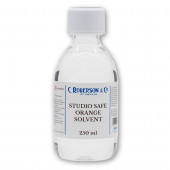
Roberson Studio Safe Solvent
Starting at: £10.90
A highly efficient and safer solvent for oil paint. Studio Safe is non-aromatic and non-flammable and has a pleasant orange smell. Use for brush cleaning and the thinning of paint and as an alternative to traditional turpentine and white spirit.
Learn More -
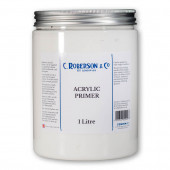
Roberson Acrylic Primers
Starting at: £15.60
Contains acrylic resin and titanium dioxide. Smooth white surface. 1 litre will cover approximately 14 square metres depending on the porsity of the surface. Learn More -
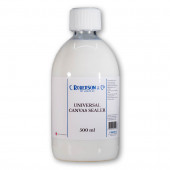
-
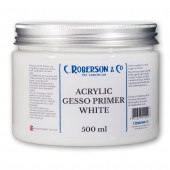
Roberson Acrylic Gesso Primer White
Starting at: £21.40
Fast drying, flexible and non yellowing white ground for oil, acrylic and tempera. Gives a matt, absorbent surface which may be sanded smooth once dry. Learn More -
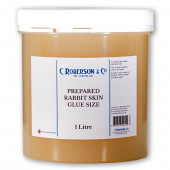
Roberson Prepared Rabbit Skin Glue
Starting at: £22.30
A ready made Rabbit Skin Glue size. Stand in warm water to liquefy. Learn More -
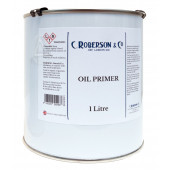
Roberson Oil Primers
Starting at: £23.30
Roberson's Traditional Oil Primer is made in small batches using the highest quality materials. Can be used on canvas or wood. Two to three coats will produce a slippery surface to enable oil colour to be moved around. Canvas should be sized before oil primer is applied using Roberson's Prepared Rabin Skin Glue. Touch dry in approx. 6h. hard dry in 24h. Paint may set in tin, shake tin and stir well before use, dilute with white spirit if desired. Prior to painting , primed canvases should be kept in daylight conditions to prevent over yellowing. Clean brushes in White Spirit. Learn More





